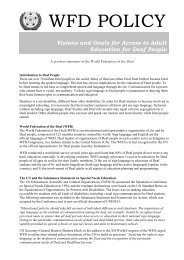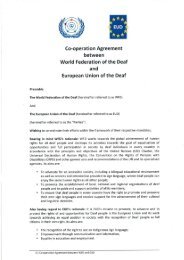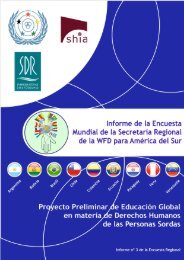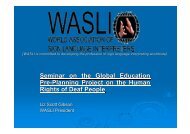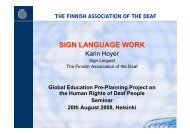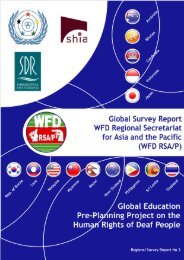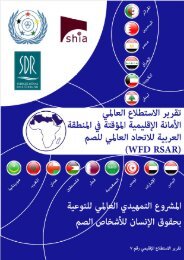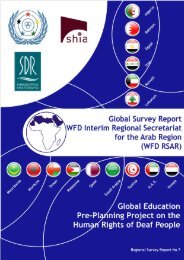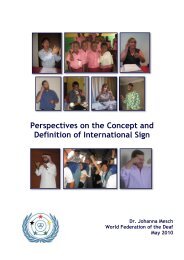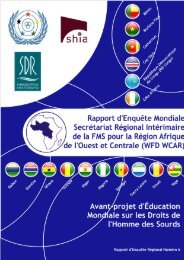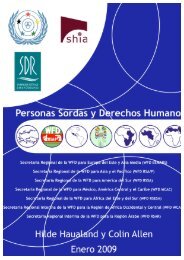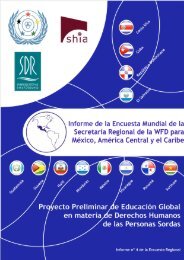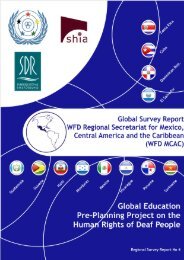Page No 1 - World Federation of the Deaf
Page No 1 - World Federation of the Deaf
Page No 1 - World Federation of the Deaf
You also want an ePaper? Increase the reach of your titles
YUMPU automatically turns print PDFs into web optimized ePapers that Google loves.
• Social Support<br />
• Support to <strong>the</strong> Factories<br />
• Financial Assistance<br />
• Sign Language News Programme<br />
• Mobile Phones<br />
Seven <strong>of</strong> <strong>the</strong> National Associations (Belarus, Bulgaria, Kazakhstan, Moldova, Russian <strong>Federation</strong>, Ukraine and Uzbekistan) have<br />
contact with <strong>the</strong>ir country’s current government. The type <strong>of</strong> contact is linked to co-ordination <strong>of</strong> laws concerning <strong>Deaf</strong> people,<br />
or contact with Ministries and/or Government Agencies concerning <strong>Deaf</strong> people’s welfare needs. Six countries (Belarus,<br />
Bulgaria, Kazakhstan, Moldova, Russian <strong>Federation</strong>, and Ukraine) have membership status within <strong>the</strong> governmental committee<br />
on issues for People with Disabilities.<br />
Five National Associations (Belarus, Bulgaria, Moldova, Russian <strong>Federation</strong>, and Ukraine) receive funding from <strong>the</strong>ir national<br />
government with three (Armenia, Kazakhstan and Uzbekistan) not receiving any government financial support at all. Those<br />
countries receiving government funding provided <strong>the</strong> annual amount <strong>the</strong>y received (see page 48) and explained <strong>the</strong> purpose <strong>of</strong><br />
<strong>the</strong> financial support.<br />
The last five questions <strong>of</strong> this section were to ascertain whe<strong>the</strong>r <strong>Deaf</strong> people have a right to vote in national, regional and local<br />
elections; are permitted to obtain a driver’s licence; can marry <strong>Deaf</strong> or o<strong>the</strong>r partners; are allowed to have children; and can<br />
adopt children. The results are as follows:<br />
Right to vote in<br />
national, regional<br />
and local<br />
elections?<br />
Allowed to obtain a<br />
driver’s licence?<br />
Allowed to marry<br />
<strong>Deaf</strong> or o<strong>the</strong>r<br />
partners?<br />
Allowed to have<br />
children?<br />
Allowed to adopt<br />
children?<br />
Yes 8 Countries (100%) 6 Countries (75%) 8 Countries (100%) 8 Countries (100%) 5 Countries (63%)<br />
<strong>No</strong> 0 2 Countries (25%) 0 0 1 Country (13%)<br />
<strong>No</strong>t available 0 0 0 0 2 Countries (25%)<br />
Based on eight respondents<br />
4.4 Access to Government Services<br />
When asked whe<strong>the</strong>r <strong>Deaf</strong> people have access to government services such as education, health care, employment, social<br />
welfare and o<strong>the</strong>r general government services, all eight countries responded ‘Yes’. To <strong>the</strong> question how <strong>Deaf</strong> people access<br />
<strong>the</strong>se government services, <strong>the</strong> main reply was that each <strong>Deaf</strong> person made <strong>the</strong>ir own personal contacts, for example through<br />
Sign Language Interpreters, with assistance from a <strong>Deaf</strong> Association or through <strong>the</strong> National Association itself if <strong>the</strong>y provided<br />
community welfare service.<br />
Ano<strong>the</strong>r aspect <strong>of</strong> access to government services was whe<strong>the</strong>r <strong>Deaf</strong> people were entitled to any financial assistance from <strong>the</strong><br />
government, to which all eight countries replied ‘Yes’. The type <strong>of</strong> financial assistance <strong>of</strong>fered to <strong>Deaf</strong> people is shown in <strong>the</strong><br />
table below:<br />
4.5 Access to <strong>the</strong> Media<br />
Disability allowance General Pension Disability-specific Pension O<strong>the</strong>r<br />
8 Countries<br />
(100%)<br />
5 Countries<br />
(63%)<br />
8 Countries<br />
(100%)<br />
3 Countries<br />
(38%)<br />
Based on eight respondents<br />
Following are <strong>the</strong> results <strong>of</strong> access to <strong>the</strong> Media for <strong>Deaf</strong> people in <strong>the</strong>se eight countries, based on three main questions:<br />
1) Does <strong>the</strong> government provide sign language services for news and/or current affairs programmes on public television?<br />
Seven countries (Armenia, Belarus, Bulgaria, Kazakhstan, Russian <strong>Federation</strong>, Ukraine and Uzbekistan) stated <strong>the</strong>ir<br />
government provides sign language services for programmes on television, such as children’s programmes, news<br />
bulletins for <strong>the</strong> <strong>Deaf</strong> Community and current affairs programmes about <strong>the</strong> National Association <strong>of</strong> <strong>the</strong> <strong>Deaf</strong>. The<br />
length <strong>of</strong> time for sign language programmes on television ranged between 10 minutes five times a week to one hour<br />
daily.<br />
2) Does <strong>the</strong> government provide subtitles/captions for news and/or current affairs programmes?<br />
Only five countries (Armenia, Belarus, Kazakhstan, Russian <strong>Federation</strong>, and Ukraine) have access to subtitles/captions<br />
for news bulletins and movies, with <strong>the</strong> hours <strong>of</strong> captioning access ranging from just 10 minutes per day to<br />
approximately 30 hours per week.<br />
3) Does <strong>the</strong> government <strong>of</strong>fer any government documents in sign language?<br />
<strong>No</strong>ne <strong>of</strong> <strong>the</strong> governments provides access for <strong>Deaf</strong> people to receive governmental documents in <strong>the</strong>ir sign language.<br />
The Project is under <strong>the</strong> auspices <strong>of</strong> <strong>the</strong> Swedish National Association <strong>of</strong> <strong>the</strong> <strong>Deaf</strong> (SDR) and <strong>the</strong> <strong>World</strong> <strong>Federation</strong> <strong>of</strong> <strong>the</strong> <strong>Deaf</strong> (WFD) <strong>Page</strong> <strong>No</strong> 17<br />
and funded by <strong>the</strong> Swedish Agency for International Development Cooperation (Sida) and Swedish Organisations <strong>of</strong> Disabled Persons<br />
International Aid Association (Shia).



